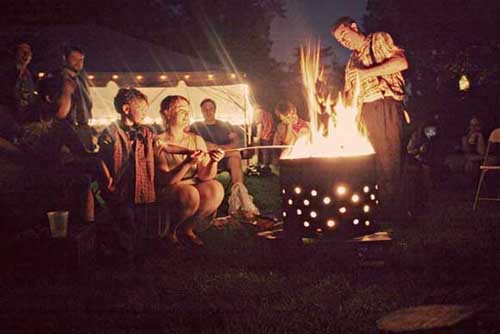This passage is not medieval, but I'm wondering whether any of you know any medieval parallels. (Early modern or modern parallels would also be great!) And it doesn't deal with women, but it deals with the poor, so, in the spirit of intersectionality, I perhaps many of you will be interested. In addition to the 19th-century text, which I am presenting in my own translation from the Hebrew, I am including also a link also to a parallel from our own day: An example of a wedding, a few years ago, where (apparently) well-to-do people fetishized poverty and made a hobo-themed party.
Rabbi Moses Sofer (born 1762, in Frankfurt, died 1839, in Pressburg), writes the following homily (for the Festival of Shavu‘oth [Pentecost – the festival celebrating God’s giving of the Law to the Israelites at the Theophany of Mt. Sinai], 1829):
Let us explain the words of the Sages of the Talmud: ‘All agree that on Shavu‘oth we need it also to be for you. [That is, not just for God, in Torah-study and prayer, but also for you, in food and drink.]’ (Babylonian Talmud, Pesahim 68b) We can explain this with a parable, in which the king’s ministers honor the king by making him a feast each year. This feast is typically made with great riches, like the feasts of King Solomon. One time, they considered what to make further, for there was nothing lacking from them or from their table, and [the king] had already become accustomed to this, so this feast, which was so routine, became considered less valuable. What did they do? They made a feast like that of poor people, with the vessels of one in exile [cf. Ezekiel 12:3], and they invited the king. And this was a novelty in his eyes; and it was made with the ultimate beauty, and the king was greatly pleased with it.
Here, too, to show honor to God with Torah-study and songs and praises is something that we do all the time; so how can we honor him more? With the feast of a poor person – that is, with food and drink and drinking wine; and through this He is praised, through the songs and praises of this poor feast, and this is his glory. This is what is meant in the words [of the Talmudic Sages]: ‘All agree that on Shavu‘oth, we need it also to be for you, [with food and drink].
And here's the link:
http://www.huffingtonpost.com/regretsy/etsy-regretsy-hobo-wedding_b_916527.html
To protect against link-rot, I'm going to copy the whole Huffington Post article here:
It’s Called “Poverty,” You’ve Probably Never Heard of It
Here’s the great thing about Etsy. As repellant as some of the shit is that I find there, there is always something worse.
Today I present one of the most insensitive features I’ve ever seen on the Etsy blog. And as usual, it’s celebrated in a circle jerk of obliviousness, complete with hipstermatic photos and dipshit Etsy drones yammering in approval.
Yes it’s a poverty wedding! How fun is that? They dressed like actual poor people! They even did some research:
We got to work researching the Depression era and hobo culture. As we prepared to make everything for our wedding, we collected feed sack dresses and old work boots, antique hand-stitched quilts and jug band instruments. After reading that the word “hobo” may be a syllabic abbreviation of “homeward bound,” we fell in love with the notion!
They fell in love with the very idea of penniless, homeless migrants, drifting from town to town, looking for work! Those hobos were just yummy, with their faded antique quilts and feed sacks, and those super cute boots they always wore. That whole period was just so desaturated and Brother Where Art Thou, which is also totes adorbs.
Okay, maybe many hobos found themselves having to leave their families in order to find enough work to support them, or maybe they escaped from harsh lives in orphanages. And, okay, maybe they died on train tracks or sweltered to death in locked box-cars. And maybe when they did finally find some work, they were set upon by thieves who took everything from them and threw them off of fast moving trains.
Don’t be such a downer! They had totally awesome trash can fires!


The important thing is, hobos were all clowns who had bandanas tied on sticks, like in cartoons.
Anyhoo, it was a super cute wedding. But I can’t help thinking that they could have done so much more with it.
Here are some ideas you can use when you have your own hobo themed depression era wedding!
• Souvenir photos on a lice ridden mattress in the weeds
• Tuberculosis screening tent
• Steal your own dinner
• Cigarette rolling contest with butts you find on the street
• Sterno martinis
• Hobo Stew bar
I’m sure you can think of lots more. Just remember to have fun with it. Golly, that’s why the Flying Spaghetti Monster made poor people in the first place!
